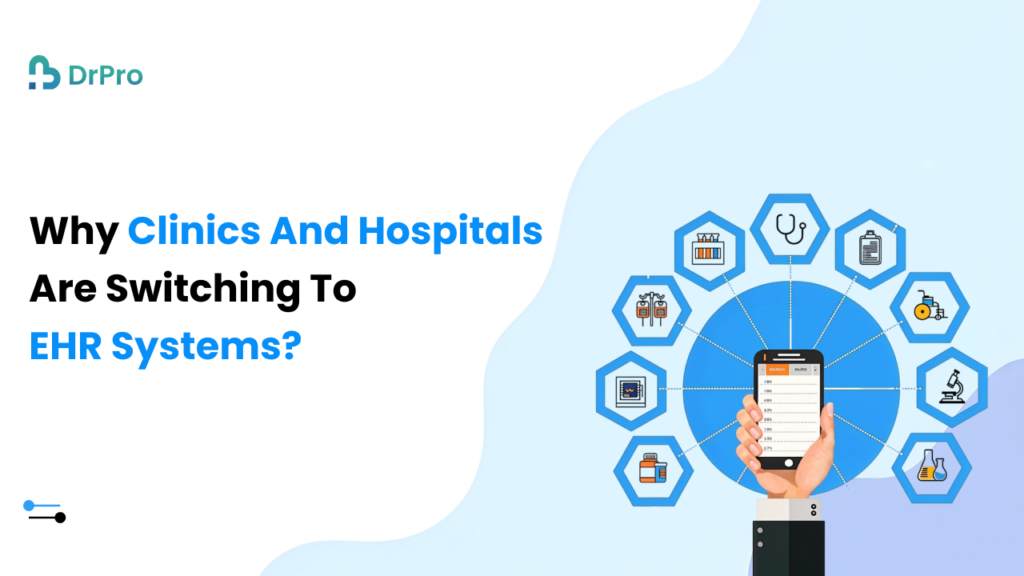Healthcare facilities are in a steady search for better patient care and operations. One of the notable changes in the recent past has been the transition from the use of records in paper format to EHR (Electronic Health Records) systems. The adoption of EHR systems by clinics and hospitals makes patient data more accessible, reduces the burden of paperwork, and improves upon rendering of the best healthcare services.
In this blog, we examine the reasons surrounding the transition of hospitals and clinics to AI-based EHR systems, the benefits thereof, and the change EHR has introduced toward both health professionals and patients.
What Are EHR Systems?
An EHR system is an electronic version of medical records. Information stored by EHR can include but is not limited to:
- Patient history
- Diagnoses and treatments
- Lab tests
- Medications
- Allergies
- Doctor’s notes
Unlike paper-based records, EHR systems allow doctors, nurses, and maybe other healthcare professionals to access and update patient information instantly.
📲 Follow us on Facebook, Instagram, Twitter, LinkedIn & YouTube for more wellness tips!
Why Clinics and Hospitals Are Switching to EHR Systems
1. Easy Access to Patient Records
In an EHR system, doctors have access to patient records anytime and anywhere. This capability is especially beneficial in case of emergencies, where quick access to guaranteed histories could save lives.
2. Improved Patient Care
Full and current records give doctors better information to make decisions about patients’ lives. With EHRs, medical errors can be minimized, the right diagnosis can be ensured, and the treatment plan can be improved.
3. Better Coordination Between Healthcare Providers
Hospitals and clinics often involve multiple specialties. EHRs enable a high level of efficiency in communication and the sharing of patient information between different doctors, nurses, and specialists.
4. Reduced Paperwork and Errors
At most, traditional paper records require a lot of space, time, and effort to manage. EHR systems go paperless, saving a lot of storage space and human effort in record maintenance since the chances of error are minimized.
5. Faster and More Accurate Billing
EHRs, thus tied with billing software, become smoother for hospitals to process insurance claims and, subsequently, billing less vulnerable to error. This positively impacts financial management and allows the patient to understand their medical expenses better.
6. Increased Patient Engagement
Most EHR systems give patients access to health records via online portals. This enables patients to become informed about their health, schedule appointments, and communicate with their doctors.
7. Compliance with Healthcare Regulations
Governments and health authorities have encouraged the use of an EHR system to ensure the standardization of medical records. Therefore, several countries mandate hospitals and clinics to go electronic to comply with such regulations.
8. Enhanced Data Security
Paper records can be lost, damaged, or stolen. The Electronic Health Records systems are specially designed to protect a patient’s sensitive information from unauthorized access through encryption and secure storage methodologies.
The Impact of EHR Systems on Healthcare
For Doctors and Healthcare Staff
- Saves time for documentation
- Less burden of managing paper records
- Facilitates informed decisions
- Improves efficiency in workflow
For Patients
- Better quality of care
- Reduction in errors in diagnosis and treatment
- Medical histories can be easily assessed
- More patient participation in healthcare
For Healthcare Administration
- Streamlined billing and insurance claims
- Improved management of hospitals and clinics
- Reduced cost in records keeping and storage
How “DrPro” Simplifies EHR Adoption
Many clinics and hospitals avoid taking up EHR systems because of initial expenses and a bit of a steep learning curve. Nevertheless, modern solutions like DrPro come forth with very customer-friendly, safe, and cost-efficient EHR software and hence simplify such a transition. With user-friendly features and robust data security, DrPro allows healthcare providers to alleviate the administrative burden while providing better patient care.
Conclusion
The EHR systems are destined to make a change in healthcare for good. They will improve efficiency in hospitals and clinics, along with better care and security for patients. EHR systems remain very relevant in the journey of technology transition.
The adoption of EHR systems is not just about digitization in healthcare but transforming it into a far more intelligent, safe, and effective system.
Frequently Asked Questions
Q1. What is the major purpose of EHR systems?
The EHR systems are aimed at the storage and treatment of patient medical records digitally to improve access and reduce errors.
Q2. How does EHR improve patient care?
Keeping accurate information on patients at the required time assists a doctor in making a better decision.
Q3. Are EHRs secured?
Yes, EHRs take the mode of encryptions plus security measures in terms of patient data.
Q4. How does EHR make it easy in billing?
Automating billing processes with reduced errors, speeding claims.
Q5. Why are hospitals asked to switch from EHR systems?
Most governments, along with the healthcare authorities, complate the hospitals to make a switch to EHR systems while following better record-keeping and compliance purposes.


